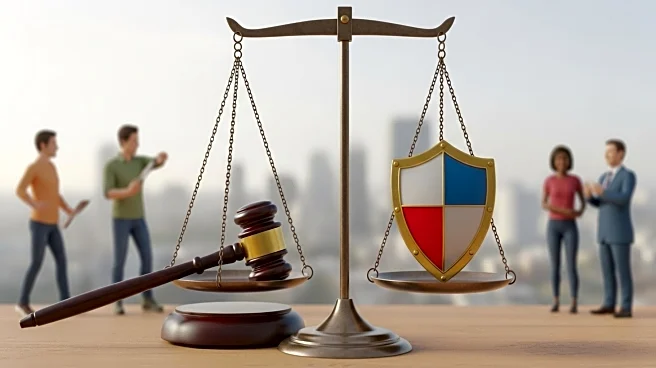What's Happening?
Governor Maura Healey of Massachusetts has publicly criticized the recent surge in immigration enforcement by U.S. Immigration and Customs Enforcement (ICE) in the state. The Department of Homeland Security confirmed the increased ICE activity, which is part of an operation called 'Patriot 2.0.' This follows a previous crackdown, 'Operation Patriot,' which resulted in nearly 1,500 arrests. Governor Healey, in an interview, described the actions as political theater and a power grab, rather than measures focused on public safety. She emphasized that Massachusetts is not a sanctuary state, countering claims from the Trump administration that sanctuary policies in cities like Boston attract criminals. Boston Mayor Michelle Wu defended the city's Trust Act, which limits cooperation with ICE on civil immigration detainers, and expressed readiness to take legal action if federal enforcement violates local laws.
Why It's Important?
The surge in immigration enforcement in Massachusetts highlights ongoing tensions between state and federal authorities over immigration policies. Governor Healey's criticism underscores the political dimensions of immigration enforcement under President Trump's administration. The actions by ICE could impact immigrant communities in Massachusetts, potentially leading to increased fear and uncertainty. The legal challenges posed by Boston's Trust Act and the federal lawsuit against the city reflect broader national debates on the balance between local autonomy and federal immigration authority. This situation may influence public opinion and policy discussions on immigration enforcement and sanctuary policies across the U.S.
What's Next?
Governor Healey's comments suggest potential legal and political challenges ahead. Boston Mayor Wu has indicated readiness to pursue legal action if federal enforcement oversteps constitutional boundaries. The ongoing lawsuit by the U.S. Department of Justice against Boston's Trust Act could set precedents affecting similar policies nationwide. As Massachusetts navigates these tensions, other states and cities may watch closely, potentially influencing their own approaches to immigration enforcement and cooperation with federal authorities. The situation may also impact upcoming elections, as immigration remains a contentious issue in U.S. politics.
Beyond the Headlines
The enforcement surge in Massachusetts raises questions about the ethical implications of immigration policies that prioritize political narratives over public safety. Governor Healey's remarks highlight concerns about the use of immigration enforcement as a tool for political gain, which could erode trust between immigrant communities and law enforcement. The broader cultural impact includes potential stigmatization of immigrants and increased polarization on immigration issues. Long-term, these developments may influence national discourse on immigration reform and the role of state versus federal authority in shaping immigration policy.










